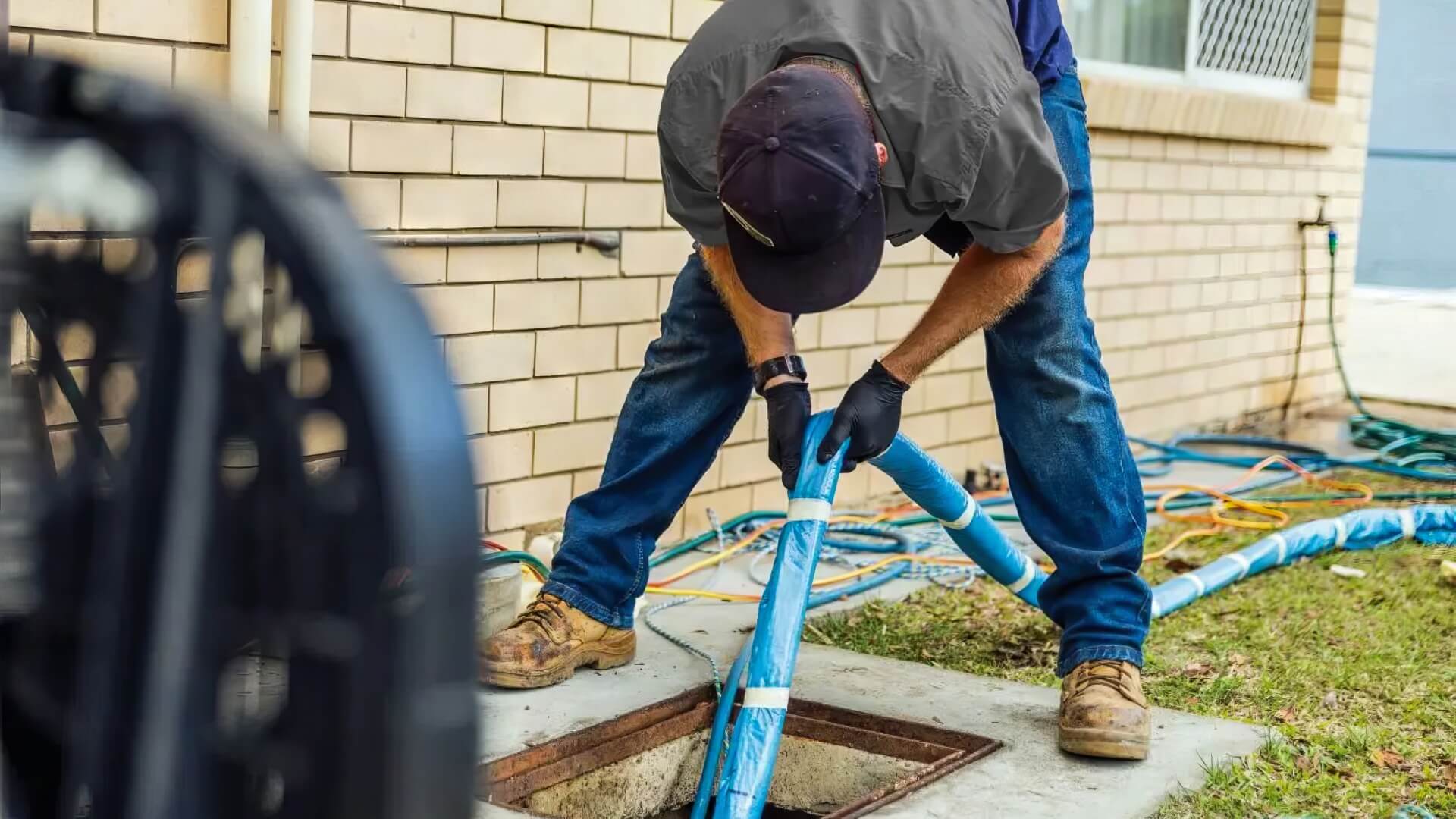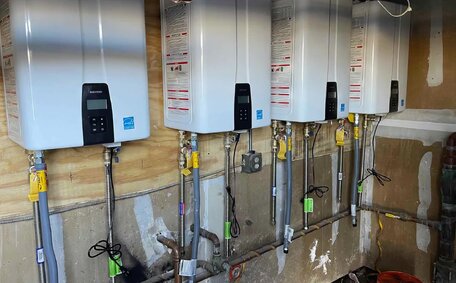Introduction to Sewer Systems and Preventing Issues
Your septic system plays a vital role in maintaining sanitation and hygiene within your home and the wider community.
An undamaged and unblocked main sewage line efficiently channels wastewater and sewage away from homes and businesses, making it essential to understand its operation to prevent the accumulation of bacteria and pollutants. When sewer systems face issues, leading to clogs, breaks, or backups, it can quickly turn into a major health risk as it allows human waste and raw sewage to pile up, potentially in rooms like your basement, or spill into outdoor spaces.
That’s precisely why proactive maintenance of your sewerage system is crucial – it is what homeowners must undertake to sidestep a sewer backup. Some of the most common causes of system blockages are tree root infiltration, pipe corrosion, and collapsed drains, which can lead to backups and may necessitate professional maintenance and repairs.
To prevent blockages, understanding what causes your sewer system to clog is key. avoid disposing of fats, oils, and grease down your drains, use sink strainers for food scraps, and keep non-flushable items out of toilets.
This guide offers essential information on how to unblock, recognize, diagnose, and address issues in your sewage system, with a focus on rectifying a blocked sewer line. We’ll cover DIY quick fixes as well as when to call a professional plumber to prevent catastrophic sewage backups or overflows.
Recognizing Signs of Sewer Line Blockages
Common indicators of sewer system problems are:
- Slow or backing up drains – If water clears out sluggishly or stalls completely, a blockage can often be the culprit, caused by various items creating a partial or complete obstruction.
- Gurgling sounds from pipes – Strange noises from the sewer pipes can mean blockages, air pockets, or waste beginning to back up.
- Foul odours indoors, particularly from floor drains, indicate sewage gas may be escaping into your home.
- Moist patches in your yard - telltale bubbling pools or drenched regions atop sewer pathways might signal a fractured conduit.
- Toilet issues – Poor flushing performance, overflowing or clogged toilets can result from main drain clogs.
Homeowners noticing any of these issues, indicative of a probable sewer blockage, should quickly call a plumber to get the problem fixed and avert a sewage backup. Ignoring a backup can lead to significant property damage or health risks, ultimately impacting your insurance claims due to overflowing wastewater.
Identifying the Cause of Sewer Backups
Understanding methods to clear your sewage system is pivotal, as several usual suspects for sewer backups can help pinpoint the core of the issue often found down drain pathways:
- Tree Root Infiltration – Roots can penetrate sewer conduits from neighbouring greenery in pursuit of moisture. Such an occurrence obstructs the passage and can damage sewer infrastructure, potentially pouring waste back into your homes.
- Pipe Breaks/Collapses – If broken pipes crack, shift, or collapse, it creates blockages and backups. Old cast iron pipes are vulnerable when soil settles.
- Blockages – Buildups of grease, waste, toys, wet wipes, and foreign objects can create a clog resulting in sewage backups.
Identifying the cause of your sewer line blocked can do wonders in guiding you towards the right solution.
In many cases, persistent backups or overflows require professional intervention, as a clog in your main sewer line can prove to be quite tenacious.
DIY Troubleshooting for Minor Sewer Drain Clogs
When asking yourself 'what do I do when experiencing a minor household clog?', there are a few methods homeowners can try before calling a professional:
- Use a Plunger - Place the plunger firmly over the drain and plunge up and down rapidly to dislodge clogs near the drain opening.
- Try a Drain Snake - Feed a hand crank auger or small plastic snake down the pipe to hook and extract clogs a few feet down.
- Use a Drain Cleaner - Only for fully clogged sinks/tubs. Follow directions to pour an enzyme or chemical drain cleaner down the affected drain and let it sit to dissolve organic obstructions.
If DIY tactics fail and sewage leaks into your house, cease attempts and consult a professional immediately. Professionals have the high-powered equipment required to clear tough clogs deep within the sewer main. Continuing DIY efforts could worsen backups and cause interior flooding.
Professional Sewer Line Repairs and Replacement
Faced with ongoing sewer issues like backups, persistent blockages, or clear pipe damage, a skilled plumber has the expertise and equipment to thoroughly inspect, repair, and replace sewer lines.
Plumbers might employ high-pressure water jetting to clear tough blockages, restoring sewer system efficiency. They also have drain cameras to literally see inside your main pipes and pinpoint the exact location and cause of the problem, whether it’s intruding tree roots, cracks, misalignments or collapsed sections.
Common sewer repair solutions that plumbers can also provide include:
- Sewer pipe relining – Trenchless repair that coats damaged pipes with an epoxy resin to seal cracks and reinforce structural stability.
- Spot repairs – Selectively replacing small sections of compromised pipe via trenching rather than the entire line.
- Drain cleaning – Uses augers, pressure jets, vacuums and cables to remove even the most stubborn obstructions.
- Tree root removal – Carefully trims or shaves down intrusive roots with special blades and machinery.
- Pipe bursting – Trenchless method that breaks up old pipe and replaces it with a new liner in the same path.
- Total line replacement – Excavates and installs entirely new sewer pipes via trenching.
For major backups connected to the city sewer, homeowners must engage a licensed, insured, and expert plumber from a reputable firm such as Colyton Plumbing. Our team can have your system pumped out with state-of-the-art diagnostics technology and proven repair methods to get it flowing freely again.
Don’t hesitate to call, email or request an appointment online with our drainage specialists if you suspect a problem with your sewer line.
We provide services across all Sydney suburbs, promptly addressing your property’s sewer issues that exceed DIY resolution.
Preventing Future Problems with Sewer Line Maintenance
Preventing complications with your septic system, akin to problems that might arise for septic tank owners, calls for consistent maintenance and smart habits to avert blockages and damage.
Homeowners are encouraged to schedule professional inspections of their house drain lines every one to two years, with camera technology to quickly identify potential issues. Plumbers can identify root intrusions, cracks, misalignments and corrosion before they escalate and resolve them as soon possible. They may recommend sewer cleaning, relining treatments or isolated repairs to extend the life of pipes and prevent situations that could damage your sewer infrastructure.
Regular use of household amenities significantly affects your sewerage system, so be vigilant about what you flush down, including effluent from your washing machine, to prevent blockages.
Avoid tipping oil and grease down your sinks; these substances can accumulate and create obstructive coatings inside your pipes. Use sink strainers and flush only toilet paper, steering clear of fats, oils, wipes, feminine products, and other non-flushable items that lead to blockages.
Installing cleanouts assures easier access for cleaning, particularly if your sewage line gets blocked. Remove flora near your pipework or trim its roots to preclude invasive damage.
Adopting these preventive maintenance actions and employing the best way to manage drain usage will significantly contribute to preventing disastrous sewage backups and overflows in the future.
Understanding Health and Environmental Risks of Sewage Backups
Sewage backups pose a major health hazard, necessitating an immediate response. Raw sewage contains high levels of harmful microorganisms like bacteria, viruses, parasites and worms that can cause severe infections and illnesses.
Direct exposure to sewage through contaminated waters can lead to gastrointestinal, skin, respiratory infections, and other health problems. Your family members most susceptible to risk, including youngsters, seniors, and individuals with weakened immune systems, face the gravest danger of harm coming your way.
Sewage also contaminates your local water supply with toxic germs. Overflowing onsite wastewater promotes mosquito breeding grounds and leaches pollution into soils, groundwater and waterways which threatens wildlife habitats.
Consequently, when sewerage backflow into homes is reported, the incidents are considered unsanitary and demand certified cleaning and disinfecting processes in affected areas. Impacted individuals must wash hands thoroughly, wear protective attire, including rubber gloves, and use eye protection while cleaning surfaces to mitigate risks. Seek medical attention if feeling unwell after exposure.
To manage hazards, check your system and contact a professional plumber promptly at the initial sign of a backup. Remediations often require special equipment, methods and expertise to clean up and restore safety. Attempting DIY sewage cleanups risks enabling germs to spread further throughout the property and neighbourhood.
Working with Local Authorities to Report and Resolve Overflow Issues
Sewage overflows on private property that have been affected should be promptly contained and cleaned up by a professional plumbing company like Colyton Plumbing. We have the expertise to safely handle hazardous sewage conditions while limiting further property damage or health risks.
If overflows imperil public areas or waterways, it’s critical to inform local authorities for joint mitigation efforts:
- Contact your local council - Notify their environmental health department, who can monitor cleanup efforts and may conduct water quality testing afterwards.
- Alert your water provider - If connected to the public sewer, inform them to initiate containment procedures and investigate potential line blockages.
- Call emergency services - If the overflow poses immediate danger to public health or entering sensitive ecosystems, alert 000 to mobilise hazard response.
By working cooperatively across private contractors like us and local government bodies, a sewer spill can be addressed quickly and effectively to restore safety and prevent escalating risks to homes or communities.
As reputable plumbers, Colyton Plumbing liaises closely with councils when responding to overflows in the affected area. We offer containment advice, supply remediation reports, and guarantee correct cleanup processes are employed on impacted properties and public zones.
Don’t hesitate to call our friendly team on 1300 349 338 Require emergency plumbing for sewage overflow or backup? Your concern is our top priority.






